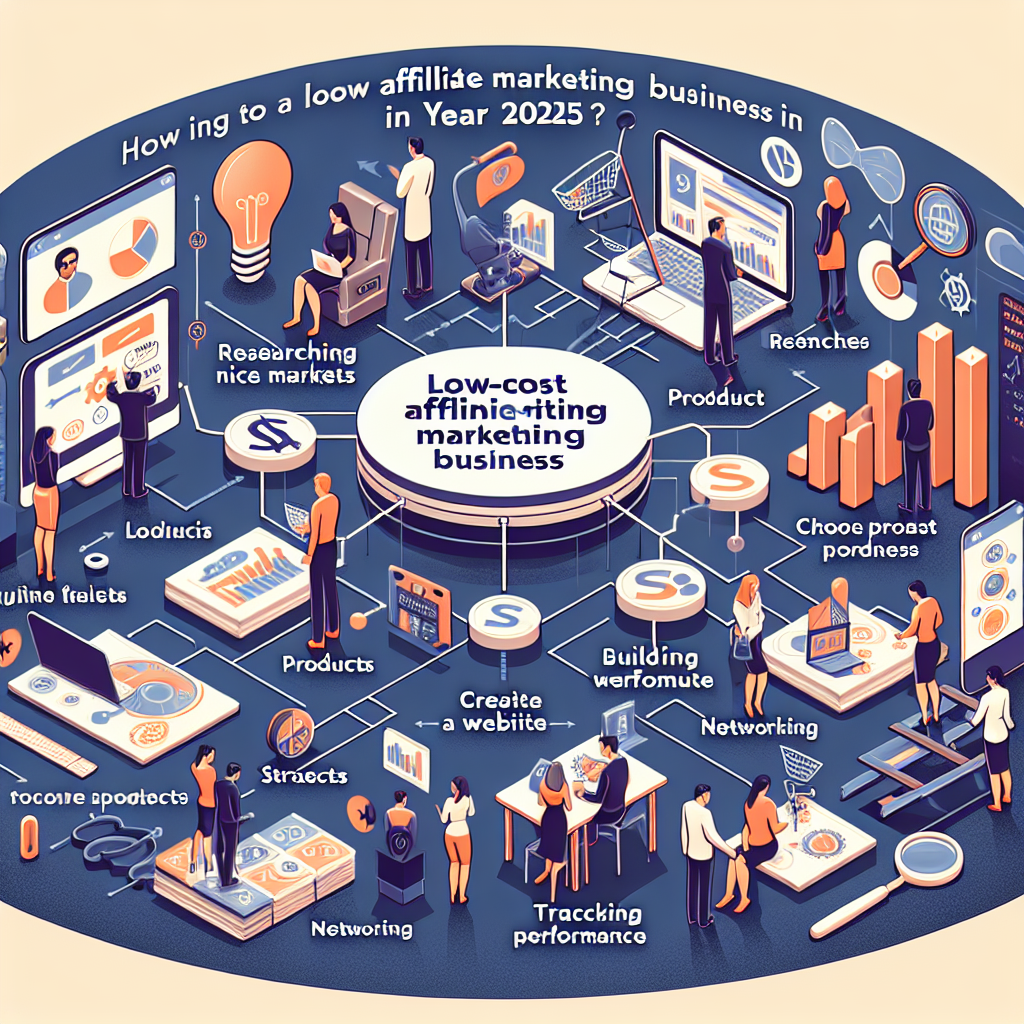-
Table of Contents
“Unlock 2025 Wealth: Launch Your Low-Cost Affiliate Marketing Empire Now!”
Introduction
In the rapidly evolving digital landscape of 2025, affiliate marketing stands out as a lucrative and accessible avenue for generating income with minimal upfront investment. As traditional business models face increasing challenges, the low-cost nature of affiliate marketing offers a compelling opportunity for entrepreneurs to tap into the vast potential of online commerce. By leveraging the power of digital platforms and strategic partnerships, individuals can create a sustainable income stream by promoting products and earning commissions on sales. This guide explores the essential steps to launching a successful affiliate marketing business, providing insights into selecting profitable niches, building an engaging online presence, and utilizing data-driven strategies to maximize earnings. Whether you’re a seasoned marketer or a newcomer to the digital world, affiliate marketing in 2025 presents a promising path to financial independence and entrepreneurial success.
Affiliate Marketing Trends in 2025: Strategies for Success
In 2025, the landscape of affiliate marketing continues to evolve, presenting both challenges and opportunities for those looking to start a low-cost business in this dynamic field. As digital marketing strategies become more sophisticated, understanding the latest trends and implementing effective strategies is crucial for success. One of the most significant trends in affiliate marketing is the increasing importance of niche markets. As the internet becomes more saturated with content, targeting a specific audience with tailored products and services can significantly enhance conversion rates. By focusing on a niche, affiliates can build a loyal audience and establish themselves as authorities in their chosen fields, thereby increasing trust and credibility.
Moreover, the rise of artificial intelligence and machine learning technologies is transforming how affiliates operate. These technologies enable marketers to analyze vast amounts of data to gain insights into consumer behavior, preferences, and trends. By leveraging AI-driven tools, affiliates can optimize their marketing strategies, personalize content, and improve targeting accuracy, leading to higher engagement and conversion rates. Additionally, AI can automate various aspects of affiliate marketing, such as content creation and customer service, allowing marketers to focus on strategic planning and relationship building.
Another trend shaping affiliate marketing in 2025 is the growing influence of social media platforms. With billions of users worldwide, platforms like Instagram, TikTok, and YouTube offer affiliates unparalleled opportunities to reach and engage with potential customers. Influencer marketing, in particular, has become a powerful tool for affiliates, as influencers can effectively promote products to their followers, driving traffic and sales. Collaborating with influencers who align with the brand’s values and target audience can amplify marketing efforts and enhance brand visibility.
Furthermore, the shift towards mobile commerce is a trend that affiliates cannot afford to ignore. As more consumers use smartphones and tablets for online shopping, optimizing websites and content for mobile devices is essential. Mobile-friendly designs, fast-loading pages, and seamless user experiences are critical factors that influence consumer decisions. Affiliates who prioritize mobile optimization can tap into this growing market and capture the attention of on-the-go consumers.
In addition to these trends, the importance of transparency and authenticity in affiliate marketing cannot be overstated. Consumers are becoming increasingly discerning and value honesty and integrity in their interactions with brands. Affiliates who prioritize transparency in their marketing efforts, such as clearly disclosing affiliate relationships and providing genuine product reviews, can build trust with their audience and foster long-term relationships. Authenticity, coupled with high-quality content, can differentiate affiliates from competitors and drive sustainable growth.
To succeed in affiliate marketing in 2025, it is essential to stay informed about industry trends and continuously adapt strategies to meet changing consumer demands. By focusing on niche markets, leveraging AI technologies, harnessing the power of social media, optimizing for mobile commerce, and prioritizing transparency and authenticity, affiliates can position themselves for success in this competitive landscape. As the digital world continues to evolve, those who embrace innovation and remain agile will be well-equipped to thrive in the affiliate marketing industry.
Building a Profitable Affiliate Marketing Business with Minimal Investment

In the rapidly evolving digital landscape of 2025, affiliate marketing continues to stand out as a viable and lucrative opportunity for individuals seeking to build a profitable business with minimal investment. As the internet becomes increasingly integrated into daily life, the potential for affiliate marketing to generate substantial income has never been greater. This business model, which involves promoting products or services and earning a commission for each sale made through your referral, offers a low-cost entry point for aspiring entrepreneurs. To embark on this journey, it is essential to understand the foundational steps that can lead to success in affiliate marketing.
First and foremost, selecting the right niche is crucial. A niche is a specific segment of the market that you will focus on, and it should align with your interests and expertise. By choosing a niche that you are passionate about, you will be more motivated to create content and engage with your audience. Additionally, a well-defined niche allows you to target a specific audience, increasing the likelihood of conversions. Conduct thorough research to identify niches with high demand and low competition, as this will enhance your chances of success.
Once you have identified your niche, the next step is to build a platform to promote your affiliate products. This platform can take various forms, such as a blog, a YouTube channel, or a social media profile. The key is to create valuable content that resonates with your target audience and establishes you as an authority in your chosen niche. High-quality content not only attracts visitors but also builds trust, which is essential for converting them into customers. Furthermore, optimizing your content for search engines through effective SEO strategies will increase your visibility and drive organic traffic to your platform.
In addition to creating content, selecting the right affiliate programs is vital. Look for programs that offer competitive commission rates and have a good reputation. It is also important to choose products or services that are relevant to your niche and provide value to your audience. By promoting products that you genuinely believe in, you will be able to maintain authenticity and credibility, which are key factors in building a loyal following.
As you begin to generate traffic and make sales, it is important to analyze your performance and make data-driven decisions. Utilize analytics tools to track metrics such as click-through rates, conversion rates, and revenue. This data will provide insights into what is working and what needs improvement. By continuously optimizing your strategies, you can maximize your earnings and achieve sustainable growth.
Moreover, networking with other affiliate marketers and industry professionals can provide valuable insights and opportunities for collaboration. Engaging in online communities, attending webinars, and participating in affiliate marketing forums can help you stay updated on industry trends and best practices. Learning from the experiences of others can accelerate your progress and help you avoid common pitfalls.
In conclusion, starting a low-cost affiliate marketing business in 2025 is a promising venture for those willing to invest time and effort into building a strong foundation. By selecting the right niche, creating valuable content, choosing reputable affiliate programs, and continuously optimizing your strategies, you can build a profitable business with minimal financial investment. As the digital landscape continues to expand, the potential for affiliate marketing success is boundless, offering a pathway to financial independence and entrepreneurial fulfillment.
Leveraging Emerging Technologies for Affiliate Marketing in 2025
In the rapidly evolving digital landscape of 2025, affiliate marketing continues to be a lucrative avenue for generating income, particularly for those who are keen to leverage emerging technologies. As the internet becomes increasingly integrated into daily life, the opportunities for affiliate marketers to reach and engage with potential customers have expanded significantly. By understanding and utilizing these technological advancements, individuals can establish a successful affiliate marketing business with minimal initial investment.
One of the most significant technological developments impacting affiliate marketing is the rise of artificial intelligence (AI). AI tools have become indispensable for analyzing consumer behavior, predicting trends, and personalizing marketing strategies. By employing AI-driven analytics, affiliate marketers can gain insights into customer preferences and tailor their content to meet the specific needs of their target audience. This level of personalization not only enhances user experience but also increases conversion rates, thereby boosting revenue.
Moreover, the proliferation of voice search technology has transformed how consumers seek information and make purchasing decisions. With the growing popularity of smart speakers and voice-activated devices, optimizing content for voice search is crucial for affiliate marketers. This involves using natural language and long-tail keywords that align with how people speak rather than type. By adapting to this shift, marketers can ensure their content remains accessible and relevant, thereby capturing a larger share of the market.
In addition to AI and voice search, the integration of augmented reality (AR) into online shopping experiences offers a unique opportunity for affiliate marketers. AR technology allows consumers to visualize products in their real-world environment before making a purchase, thereby reducing uncertainty and increasing confidence in buying decisions. Affiliate marketers can capitalize on this trend by partnering with brands that offer AR experiences, thus providing added value to their audience and enhancing the likelihood of earning commissions.
Furthermore, the expansion of blockchain technology presents new possibilities for affiliate marketing. Blockchain’s decentralized nature ensures transparency and security in transactions, which can help build trust between marketers and consumers. By utilizing blockchain-based platforms, affiliate marketers can track and verify sales more accurately, ensuring they receive fair compensation for their efforts. This technology also facilitates the creation of smart contracts, which automate commission payments and reduce the potential for disputes.
Social media platforms continue to be a powerful tool for affiliate marketers, and in 2025, their influence is more pronounced than ever. With the advent of new social media features and platforms, marketers have more avenues to connect with their audience. By creating engaging and authentic content, affiliate marketers can build a loyal following and drive traffic to their affiliate links. Additionally, the use of micro-influencers—individuals with smaller but highly engaged audiences—has proven effective in reaching niche markets and generating higher conversion rates.
Finally, the importance of mobile optimization cannot be overstated. As more consumers rely on their smartphones for online shopping, affiliate marketers must ensure their content is mobile-friendly. This includes fast-loading pages, easy navigation, and responsive design. By prioritizing mobile optimization, marketers can provide a seamless user experience, which is crucial for retaining visitors and encouraging them to complete purchases.
In conclusion, the affiliate marketing landscape in 2025 is shaped by emerging technologies that offer innovative ways to connect with consumers and drive sales. By embracing AI, voice search, AR, blockchain, social media, and mobile optimization, aspiring affiliate marketers can establish a successful business with minimal upfront costs. As these technologies continue to evolve, staying informed and adaptable will be key to thriving in this dynamic industry.
Conclusion
In 2025, starting a low-cost affiliate marketing business remains a viable and lucrative opportunity for generating income. By leveraging digital platforms, individuals can promote products and services through strategic content creation and targeted marketing efforts. The key to success lies in selecting the right niche, building a strong online presence, and cultivating relationships with both audiences and affiliate partners. With minimal initial investment, affiliate marketing offers flexibility and scalability, making it an attractive option for entrepreneurs seeking financial independence. As digital commerce continues to grow, those who adapt to emerging trends and technologies will be well-positioned to capitalize on this dynamic industry.
